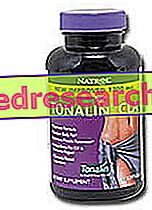Definition
Pyelonephritis (or upper urinary tract infection ) is an inflammatory process that affects the kidney and mucosa of the renal pelvis (pelvis): the disease, both acute and chronic, is very annoying and painful, especially during the passage of urine .
Causes
Infectious agents are the etiological factors most involved in pyelonephritis; bacterial infections, in turn, are closely related to cystitis, prostatitis and urethritis. Among the predisposing factors of pyelonephritis, we mention: calculosis, diabetes, pregnancy, debilitating pathologies, urine stagnation, female sex.
Symptoms
Multiple symptoms associated with pyelonephritis: albuminuria, bacteriuria, dysuria, abdominal and lumbar pain, pain during urination (stranguria), fever, nausea, foul-smelling urine, septicemia (acute pyelonephritis) and vomiting.
Information on Pyelonephritis - Drugs for the Treatment of Pyelonephritis is not intended to replace the direct relationship between health professional and patient. Always consult your doctor and / or specialist before taking Pyelonephritis - Drugs for the treatment of Pyelonephritis.
drugs
Most patients with acute pyelonephritis without signs of septicemia are generally treated at home with antibiotic drugs; in case of severity, the patient must be hospitalized and treated parenterally with specific drugs.
Antibiotics are the drugs of choice in the treatment of pyelonephritis: in fact, these substances ensure the eradication of the pathogen from the urinary tract. In most cases, the infectious agent is eliminated in 14 days of antibiotic treatment, but the duration of treatment may vary depending on the severity of the patient's clinical picture.
Cephalosporins : broad-spectrum beta-lactam type antibiotics. These drugs exert their therapeutic activity by inhibiting the synthesis of the bacterial cell wall:
- Cefuroxime (eg. Cefoprim, Tilexim, Zoref, Zinnat): belongs to the second generation cephalosporin class. It is recommended to take 750 mg to 1.5 g of active ingredient every 8 hours; alternatively, 250-500 mg twice daily for 14 days, depending on the nature and severity of the disease.
- Cefadroxil (eg Duricef): first generation cephalosporin, indicated in case of pyelonephritis without complications. Oral administration of 1 gram of drug is recommended every 12 hours for 14 days.
- Cefotaxima (eg Cefotaxima, Aximad, Lirgosin): third-generation cephalosporin, generally administered intravenously, particularly active against gram-negative. Administer parenterally from 1 to 2 g of drug every 8-12 hours. Do not exceed the dose of 2 grams every 4 hours. The therapy should be continued for 14 days.
Quinolones: indicated in case of complications associated with pyelonephritis:
- Ciprofloxacin (eg. Ciprofloxac, Samper, Ciproxin, Kinox): in the case of acute pyelonephritis without complications (septicemia), it is recommended to administer 1 gram of the drug every 24 hours, for 7-14 days. In the case of infantile pyelonephritis (patient age 1-18 years) caused by E. Coli, IV administration of 6-10 mg of drug per kilogram of body weight is recommended every 8 hours for 10-21 days. Do not exceed 400 mg total per day. It is possible to administer the drug orally: 10-20 mg / kg every 12 hours for 10-21 days. Do not exceed the maximum dose of 750 mg / day. Ciprofloxacin gives unpleasant side effects: for this reason, it is not a drug of first choice for the treatment of pyelonephritis.
- Levofloxacin (eg Levofloxacin, Levixiran, Aranda): it is recommended to administer 250 mg of drug orally or intravenously for 10 days; alternatively, take 750 mg of active ingredient every 24 hours, for 5 days.
Carbapenemics : another class of antibiotics useful for the treatment of pyelonephritis
- Doripenem (eg Doribax): it is recommended to take 500 mg IV every 8 hours. The administration of the drug via parenteral route, for a period of 10-14 days, can be converted into an oral therapy after the first 3 days (for IV), maintaining the same posology.
Sulfonamide antibiotics
- Sulfamethoxazole / trimethoprim (eg Bactrim): administer 160-800 mg of active ingredient orally every 12 hours, for a period varying from 7 to 14 days, as established by the doctor.
Gentamicin (eg. Gentamicin, Ciclozinil, Genbrix, Gentalyn): amyglycoside antibiotic. Begin therapy with pyelonephritis by administering IV 2 mg / kg, followed by 1.7 mg / kg every 8 hours (or 5 mg / kg IV every 24 hours). The therapy should be continued for 7-14 days, depending on the nature and severity of the pyelonephritic infection.



